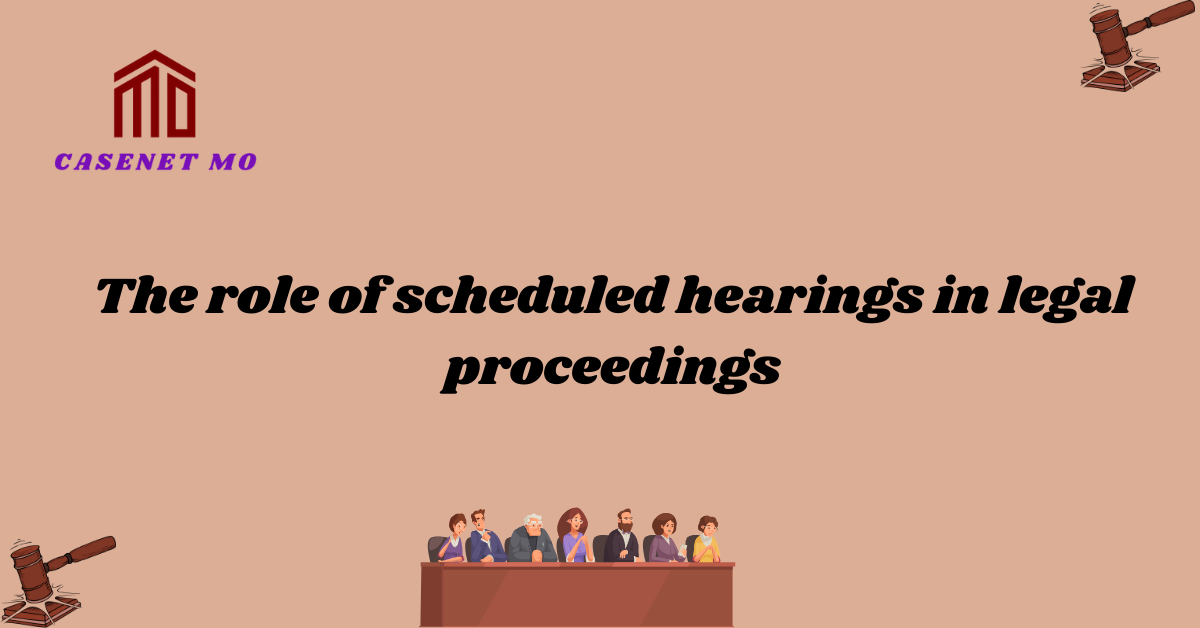The role of scheduled hearings in legal proceedings
Legal proceedings are complex and multifaceted, often requiring a delicate balance between fairness and efficiency. One crucial aspect of these proceedings is the role of scheduled hearings, which serve as vital milestones in the pursuit of justice. These hearings provide a platform for parties involved to present their arguments, evidence, and testimonies, ensuring that all voices are heard and considered.
By establishing a structured framework, scheduled hearings facilitate the orderly progression of legal cases. They allow for the careful examination of facts, the exploration of legal principles, and the opportunity for thorough cross-examination. Through this process, the truth can be uncovered, allowing for informed decisions to be made by judges, juries, or other decision-makers.
The Importance of Timely Hearings
Scheduled hearings play a crucial role in the legal system by ensuring that cases progress in a timely and efficient manner. These hearings serve as important milestones that help keep legal proceedings on track and prevent unnecessary delays.
Efficiency Through Structure
By establishing a structured framework, scheduled hearings contribute to the overall efficiency of the legal process. Parties involved can prepare and present their arguments, evidence, and testimonies within a specified timeframe, allowing for a focused and organized examination of the case.
A Platform for All Voices
One of the fundamental principles of justice is the opportunity for all parties to be heard and considered. Scheduled hearings provide a platform for each side to present their perspectives, ensuring that all voices are given equal weight and consideration in the decision-making process.
Uncovering the Truth
Through the careful examination of facts and the exploration of legal principles, scheduled hearings serve as a means to uncover the truth. Cross-examination allows for a thorough evaluation of testimonies, enabling judges, juries, or other decision-makers to make informed decisions based on the evidence presented.
Ensuring Fairness
Another vital aspect of scheduled hearings is their role in maintaining fairness throughout the legal process. By providing a structured platform for the presentation of arguments and evidence, these hearings ensure that each party has an equal opportunity to present their case and challenge the opposing side’s claims.
Guidance for Decision-Makers
Scheduled hearings also provide valuable guidance for judges, juries, or other decision-makers involved in the case. By presenting a comprehensive overview of the arguments and evidence, these hearings help decision-makers gain a deeper understanding of the complexities of the case and make well-informed judgments.
A Step Towards Justice
Ultimately, scheduled hearings are a crucial step toward achieving justice. By providing a structured and fair platform for the presentation and examination of evidence and arguments, these hearings contribute to the pursuit of truth and the resolution of legal disputes in a manner that upholds the principles of fairness and efficiency.
FAQs
How do set hearings boost legal efficiency?
By establishing a structured framework, scheduled hearings contribute to the overall efficiency of the legal process. Parties involved can prepare and present their arguments, evidence, and testimonies within a specified timeframe, allowing for a focused and organized examination of the case.
Why give all voices a platform in hearings?
One of the fundamental principles of justice is the opportunity for all parties to be heard and considered. Scheduled hearings provide a platform for each side to present their perspectives, ensuring that all voices are given equal weight and consideration in the decision-making process.
How do hearings aid truth discovery?
Through the careful examination of facts and the exploration of legal principles, scheduled hearings serve as a means to uncover the truth. Cross-examination allows for a thorough evaluation of testimonies, enabling judges, juries, or other decision-makers to make informed decisions based on the evidence presented.
How do hearings ensure fairness in law?
Another vital aspect of scheduled hearings is their role in maintaining fairness throughout the legal process. By providing a structured platform for the presentation of arguments and evidence, these hearings ensure that each party has an equal opportunity to present their case and challenge the opposing side’s claims.
How do hearings guide decisions?
Scheduled hearings also provide valuable guidance for judges, juries, or other decision-makers involved in the case. By presenting a comprehensive overview of the arguments and evidence, these hearings help decision-makers gain a deeper understanding of the complexities of the case and make well-informed judgments.
What is the ultimate goal of scheduled hearings?
Ultimately, scheduled hearings are a crucial step towards achieving justice. By providing a structured and fair platform for the presentation and examination of evidence and arguments, these hearings contribute to the pursuit of truth and the resolution of legal disputes in a manner that upholds the principles of fairness and efficiency.







